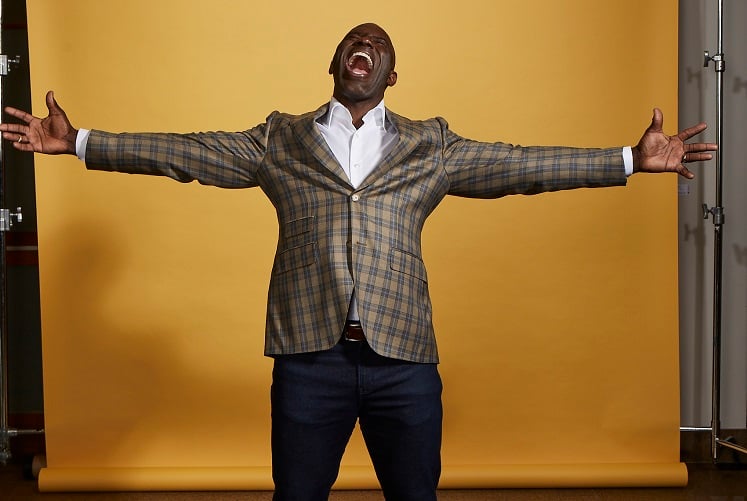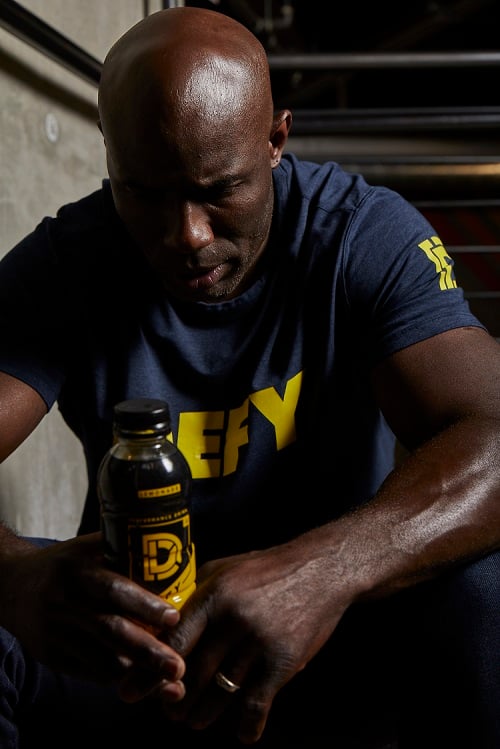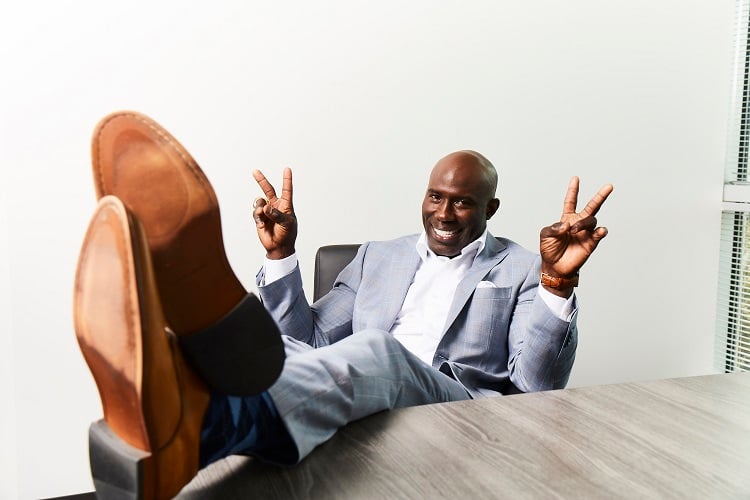Broncos Icon Terrell Davis is Back in Business
Davis returns to the spotlight in a new competitive field - CBD
Stewart Schley //September 6, 2019//
Broncos Icon Terrell Davis is Back in Business
Davis returns to the spotlight in a new competitive field - CBD
Stewart Schley //September 6, 2019//
![]()
PHOTOS BY JEFF NELSON.
Anybody who has ever organized a company event would be getting paranoid right now. Guests have been gathering in the theater room of a determinedly hip warehouse building in Denver’s River North neighborhood for an hour. But it’s nearly 20 minutes past the appointed start time, and the emcee is missing. Smartly dressed people from the PR firm are huddling around somebody’s phone, whispering and looking concerned. A handful of sports reporters, The Athletic’s Nicki Jhabvala and KMGH-TV correspondent Troy Renck among them, have stopped chatting in the front row and are pecking away at keypads. The man sitting next to me, a financial adviser who won a radio call-in contest this morning and now is here among luminaries and athletes and hangers-on, has filled me in on his daughter’s middle-school experience and his divorce, and we’ve run out of things to talk about. Basically, the room is losing its patience.
And then: Look who’s here, striding purposefully to the stage, taking control. It’s Terrell Davis. That Terrell Davis, No. 30, the NFL Hall of Famer, the Super Bowl XXXII MVP, the guy who used to catch pitchbacks from John Elway, feign a path around the outside edge and then dart inside, leaving mystified linebackers grasping armfuls of air. The running back who racked up a gaudy 7,600 rushing yards in seven seasons, who introduced Broncos Nation to the Mile-High Salute, who still holds the NFL record for the most touchdown runs in a postseason. That Terrell Davis, fit and athletic in an open-collared robin’s egg shirt under a navy suit, lifts a microphone from its stand and flashes a familiar smile and assures people that it’s all good, that we’re about to get this thing going, that we just need to hang in a few more minutes.
I have no idea if this is true, or if he’s improvising on the spot. Either way, confidence is restored. The room buzzes anew. TD is in the house.
“TD” – his friends really do call him that – is like that: affable, confident, easy to like. When we meet, he shakes his head in sympathy when, angling for small talk, I complain I get too many junk calls on my iPhone. “Same here, man,” TD says, settling into a chair and rolling up to a glass table in a Greenwood Village office. “I don’t even answer mine half the time.”
See how he did that? See how that just worked? That was Terrell Davis: regular guy.
Who is anything but.
“He’s handsome, he’s fit. He looks successful — and he is successful,” says Reggie Rivers, a former Denver Broncos teammate. “He is a whole human. And you can’t say that about all athletes.”
Today’s event is a coming-out party for Defiance Enterprises LLC, the Denver-based maker of a new “performance drink” laced with a precision-calibrated 20 milligrams per can of cannabidiol (or CBD). Defy, the company’s signature brand, is packaged in bold, primary colors, available in three fruit flavors, and is in significant part dependent on Terrell Davis to supply star power, brand charisma and a chunk of the investment capital. If Defy takes off in what’s becoming a crowded but promising market for CBD products, it will be partly because of contributions from Terrell Davis, athlete-turned-businessman.

It’s a path many have tried, not always successfully. Even Denver’s favorite football son Elway has a mixed business record, mixing big hits (the popular steakhouse Elway’s, a lucrative auto dealership) with misses, like a failed laundromat venture and an e-commerce sporting goods site that tanked. More common than the ex-NFL-er who rises to the business forefront is the retiree who fades from the limelight. The 1980s-era Broncos wide receiver Vance Johnson is an addiction counselor in Florida. Former first-round draft pick Tommy Maddox recently left a job coaching high school baseball in Texas.
The link between on-the-field prowess and success in business has been written about and talked about exhaustively – clichés around teamwork and game plans abound. But as he prepares to deal with the uncertainties of a new business venture, one he’s backing with his money, his time and his prominence, Davis brings something to the field of play that sets him apart.
Davis brings headaches.
Headaches that for years brought TD, the mighty TD, to his knees. Headaches like the one that famously sidelined Davis early in the second quarter of Super Bowl XXXII, leading coach Mike Shanahan to insert the triple-visioned Davis into the backfield purely as a decoy. (It worked; Elway scored on a one-yard dive.) Headaches lasting hours and sometimes days, so dispiriting that more than once TD thought about ending his life, an admission he recounts openly, in a matter-of-fact cadence. “I thought about suicide several times,” Davis says.
Migraine Nation
 The American Migraine Association estimates more than 37 million Americans suffer from a neurological disorder that causes a particularly sinister breed of headache characterized by severe pain and often preceded by extreme sensitivity to light. This has pretty much been the standard progression for Davis since he was 9 years old: a dazzle of light followed by pulsing pain. The first time he experienced a migraine, Davis was waiting for his mom to pick him up from football practice in a San Diego school parking lot. After that, they wouldn’t stop.
The American Migraine Association estimates more than 37 million Americans suffer from a neurological disorder that causes a particularly sinister breed of headache characterized by severe pain and often preceded by extreme sensitivity to light. This has pretty much been the standard progression for Davis since he was 9 years old: a dazzle of light followed by pulsing pain. The first time he experienced a migraine, Davis was waiting for his mom to pick him up from football practice in a San Diego school parking lot. After that, they wouldn’t stop.
If you haven’t heard about the restorative powers of CBD, you’re probably not getting out much. The hemp derivative won’t get you high (that’s its cousin, THC). Instead, it talks to receptors that regulate mood, appetite and pain sensations. Following an endorsement in January by the World Health Organization, CBD has become a darling of the cannabis category. BDS Analytics, a Boulder-based market research firm, thinks CBD products could produce $20 billion of sales by 2024 on the strength of “a storied history of health and wellness use, and anecdotal evidence of efficacy.”
Davis, now 46, already is sold. Two years ago, tired of warding off migraines with twice-daily doses of the prescription medicine Naproxen, Davis took a flyer on CBD at the urging of a friend from Denver, Defy’s co-founder and CEO Beau Wehrle. The former hedge fund manager had become fascinated about CBD after selling the Denver-based investment firm he’d founded.
In Davis, he found a willing partner. The two men had met years before at a fantasy football event in Las Vegas, hit it off, and remained friends. At the same time Wehrle and his business partner Megan Bushell were starting to shape a business plan, Davis was home in Temecula, California, feeling fatigued and sore. The same muscular frame that once carved through defenses ached after every workout. “I thought that was it for me,” Davis says. “My knee’s going to be swollen, I can’t work out. I came to terms with it. That’s just the way it is. I’m old, I’m getting gray. That’s life.”
Davis, who lives with his wife and three kids in Southern California, had heard about CBD – who hadn’t? – but he remained skeptical. Still, he was weary: from constant dosing of Naproxen, from persistent worry about migraines. He remembers feeling nervous as he squeezed out a few CBD drops from one of the tinctures Wehrle had sent to Davis’ home. Leaving the Naproxen in the medicine cabinet was the risky part. “Anybody who’s had migraines knows that if you’re off your meds, it’s like a time bomb waiting to go off,” Davis says.
Davis braced himself. “A month went by: no migraine,” Davis says. “Two months went by: no migraine. Three months went by: no migraine.” Since applying those first drops, Davis has experienced just one episode – the familiar aura that typically precedes a migraine. But this time, no headache followed. More than 18 months after first taking CBD, Davis hadn’t had a full-on episode, and the inflammation in his knees had subdued. When we met in May, he was preparing to fly to California to run in a track meet. “It’s almost like I’m turning back the clock,” Davis says.

Doing the Math
Maybe Davis just got lucky. Maybe the migraines had run their course. Maybe it’s all wishful thinking. But Davis, who earned a degree in consumer economics from the University of Georgia while rushing for 1,657 yards, can do his own math. “The only thing I’d changed was what I was taking over this span of time,” he says. “The longer it went, with no episodes, the more confident I’d become.”
That was enough to tip the balance: Davis joined Wehrle and Bushell as a partner in the business they were forming. They chose the brand name “Defy” to reflect a willingness to challenge convention.
Wehrle, an energetic 45-year-old who might qualify as the world’s most enthusiastic CBD proponent, realizes tales of Davis’ personal torment won’t move product off the shelf. Instead, Wehrle talks about differentiating elements like an extraction process that assures precision CBD levels and removes any trace of THC. Bushell also points to a patented technique for producing rapid “bio-absorption,” which means the CBD gets where it needs to go quicker.
But a demanding manufacturing process is expensive. Defy costs $7.99 per 16-ounce bottle. The Defy team is going to have to convince lots of consumers – everyone from professional athletes to weekend warriors – that the premium is worth it.
As of late July, Defy depended mainly on orders from its website, but retail deals were in the works. So is a broadening slate of endorsements. In July, the world’s No. 14-ranked tennis pro John Isner signed on as another sports-celebrity endorser. In May, Defy logos were emblazoned across two Indianapolis 500 race cars.
If CBD really does take off like BDS analysts think it will, it could spark a land rush from mainstay beverage companies that want a ready-made route to prominence. Defy could present an attractive acquisition target down the road.
For now, though, the emphasis is on the daily blocking-and-tackling required of any startup: budgets, personnel issues, manufacturing, legal opinions. I asked Davis, who made millions as an NFL player, why he’s willing to take on the grinding minutiae of being in business.
He says it’s because he misses the struggle: Competing. Getting hit.
“When I retired, I thought: I’m going to play golf, every single day. I am going to shut it down, and I am going to live the life of doing nothing,” Davis says. “I did that for a year and a half. And I was bored out of my mind.”
Reggie Rivers gets that. A friend and teammate of Davis in 1995 and 1996, Rivers says meaningful challenge is important for individuals who have spent their life competing at a high level. Rivers, who runs a motivational speaking business called Gala, points out even the greatest running backs get tackled 95 percent of the time. “The important thing is to focus on forward progress,” he says.
Davis’ business interests extend to a suburban Denver investment management company, Alpha One Tax and Wealth, where he shares stories with clients how he has made money, lost money, had money stolen from him, and learned about the importance of having the right people around. Wally Darling, a partner in the firm (his official title is “Quarterback”) says Davis contributes a brand of integrity not all former pros can match. “There are a lot of professional athletes who I would not want to have anything to do with,” Darling says.
Davis retired from the NFL after the 2001 season. After surgery to repair his torn-up right knee, Davis couldn’t reclaim the magic: the familiar rumble, the gait, the blend of speed and power. For a while, Davis thought he could live without the game.
But a return to the spotlight as an NFL Network analyst wasn’t enough. Davis wanted another chance to beat the odds. He should get plenty of that with Defy, which is entering a crowded field with an expensive product. But Davis has a history of surprising people. He was largely overlooked as a pro football prospect, drafted in the sixth round and tagged as a special teams contributor at best. He’s now in the NFL Hall of Fame. Terrell Davis is 46, he looks great, and his head doesn’t hurt anymore. He’s determined to win again.
























